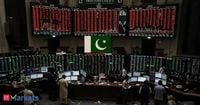Trading was halted for an hour on Thursday at the Pakistan Stock Exchange after the benchmark KSE-100 index tumbled 6.3%, according to an exchange notification. The halt followed reports that multiple drones were shot down over major cities including Karachi and Lahore, intensifying concerns of a wider conflict between the nuclear-armed neighbors. Thursday’s steep selloff came on the heels of a dramatic 6,500-point plunge on Wednesday, when the KSE-100 opened sharply lower and eventually closed down 3.1%.
The slide began after India launched “Operation Sindoor,” targeting what it described as terrorist infrastructure inside Pakistan. The military action came in response to the deadly Pahalgam attack in Indian Kashmir that killed 26 civilians in late April. Indian armed forces targeted air defense radars and systems at a number of locations in Pakistan on Thursday, the government said in a statement. The Pakistan military stated that it had shot down 25 Indian drones.
The turmoil on the KSE-100 also spilled over into Pakistan’s international bond markets. The 2036 maturity suffered the biggest loss among the country’s dollar bonds, falling more than 1 cent to be bid at 73.8 cents on the dollar, according to Tradeweb data.
Meanwhile, the KSE-30 index also faced a significant setback, plunging 7.2% on Thursday, May 8, 2025, marking a second straight session of steep losses. The index showed signs of recovering earlier in the day after registering one of its steepest single-day losses in history. Investors are now closely monitoring the situation, as the broader gauge KSE-100 was down 6.3% before trading was suspended, a day after it had also fallen 3.13%.
In contrast, Indian stock markets demonstrated remarkable resilience, with the Nifty50 and the Sensex only down by 0.5% and 0.58%, respectively, on Thursday. This stark contrast highlights the volatility of the Pakistani market, which has historically shown increased fluctuations during heightened India-Pakistan tensions.
The recent downturn in the Pakistani stock market can be traced back to the Pahalgam terror attack on April 22, 2025. This incident has led to a growing sense of unease among investors, exacerbated by India's recent military actions. Economic measures taken by India, including the suspension of the Indus Waters Treaty and restrictions on imports, vessels, and postal deliveries, have further unsettled investors in the Pakistani financial markets.
Despite the low stock valuations, the market continues to experience foreign capital outflows and limited participation from institutional investors. According to Moody's assessment, the escalating bilateral tensions would have a more severe impact on Pakistan's economy compared to India's. The thin trading volumes enable rapid foreign investor exits when perceived risks rise, which is evident in the current market behavior.
The trading halt in Pakistan's stock market followed a blast in Lahore on Thursday morning, which further fueled investor concerns. The Indian Armed Forces targeted air defense radars and systems at various locations in Pakistan, responding to what they described as Pakistan's attempts to engage military targets in Northern and Western India.
Pakistan's military has stated it “reserves the right to respond, in self-defense, at a time, place, and manner of its choosing.” However, Indian officials have made it clear that their armed forces are fully prepared to respond to any possible misadventures by Pakistan that could escalate the situation.
In the wake of these tensions, various countries, from Singapore to Israel, have advised their citizens to defer all non-essential travel to Jammu and Kashmir in India and to Pakistan, amid growing fears of conflict.
The economic condition in Pakistan remains precarious, heavily dependent on International Monetary Fund (IMF) support packages. Recent signs of economic recovery face potential reversal amidst rising tensions with India. The nation faces several economic hurdles, including declining growth rates, rupee depreciation, and potential credit downgrades without continuous IMF support.
Prior to the recent flare-up in hostilities, the Pakistani stock market had shown signs of recovery, driven by improved investor confidence from a sovereign credit rating upgrade and falling global oil prices. However, with fresh geopolitical uncertainties looming, the IMF’s funding decision will be closely watched as a key determinant of near-term market direction.
Pakistan’s equity market delivered an impressive 84% return in 2023, its best performance in over two decades, attracting increased foreign interest from asset managers like BlackRock and Eaton Vance. However, this recovery is now threatened by the current geopolitical climate, leading to a cautious outlook among investors.
As the situation evolves, the implications for both countries and their respective economies will continue to unfold, leaving investors and analysts alike on high alert.



